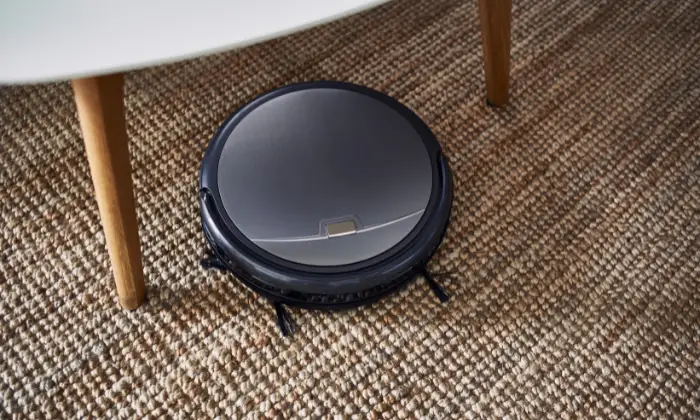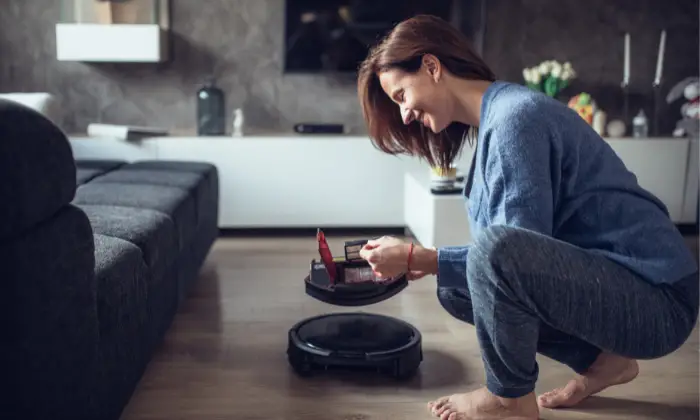
Robot vacuums have revolutionized the way – we clean our homes. Their advanced technology and convenient features have become popular with busy homeowners who want to keep their floors spotless without lifting a finger. But, as with any household appliance, a robot vacuum will eventually reach the end of its lifespan.
This blog will explore: how long do robot vacuums last and what factors can affect their lifespan. We’ll also provide tips on extending your robot vacuum’s life so you can enjoy its benefits for as long as possible.
So, let’s dive in and discover how long your robot vacuum can last!
A brief overview of robot vacuums

A robot vacuum is an autonomous cleaning device that uses advanced technology to navigate and clean floors in a home or office. It typically employs sensors, cameras, and mapping software to scan and map the environment and then uses suction or brushes to collect dust, dirt, and debris.
Robot vacuums are designed to work independently, allowing users to set them up to clean on a schedule or with the push of a button. They come with various features such as self-docking and recharging, HEPA filtration, and app-based controls.
Robotic vacuums becoming increasingly popular due to their convenience – ease of use, and ability to clean floors effectively and efficiently. Sometimes you must know how often to run a robot vacuum cleaner.
Why Vacuum cleaner is popular

- Quality of the vacuum and its components: A robot vacuum with higher-quality parts and materials generally has a longer lifespan than one with lower-quality components.
- Frequent usage and maintenance: Regularly using and maintaining a robot vacuum can help to prolong its lifespan by – keeping it in good working condition.
- Operating conditions: The dirt and debris level in the home, as well as the type of flooring, can affect how often the vacuum is used and how hard it has to work, which can impact its lifespan.
- Battery life: Most robot vacuums rely on rechargeable batteries to power their cleaning. Over time, batteries can degrade and lose capacity, which can shorten the lifespan of the robot vacuum.
- Operating environment: Robot vacuums used in harsher environments, such as those with a lot of dust or pet hair, will likely have a shorter lifespan than those used in cleaner environments.
- Quality of the filter: The filter is an essential component of the vacuum that captures dust and dirt. If the filter is not of good quality, it will clog up quickly and decrease the vacuum’s suction power.
- Over usage: Using the robot vacuum for more than recommended can put extra stress on the machine and decrease its lifespan.
- Accidents: Robot vacuums are designed to navigate around obstacles, but accidents can happen, such as falling down the stairs or getting stuck in tight spaces, which can damage the device and shorten its lifespan.
How Long Do Robot Vacuums Last: Average Lifespan
The average lifespan of a robot vacuum can vary depending on several factors – including the quality of the vacuum and its components, the frequency of usage and maintenance, and the operating conditions in the home. However, most robot vacuums are designed to last between 1-5 years with proper usage and maintenance.
It’s important to note that – the lifespan of a robot vacuum can also vary depending on the brand and model. Some high-end models may have a longer lifespan, while others may have a shorter one.
Additionally, the lifespan of a robot vacuum may also be influenced by the warranty offered by the manufacturer. Many robot vacuums come with a one-year warranty, which covers any defects or issues that may arise during that time.
Compared to traditional vacuums, the lifespan of a robot vacuum is generally shorter. Traditional vacuum cleaners are built to last around 7-15 years with proper usage and maintenance. However, it’s worth noting that the convenience and ease of use provided by robot vacuums can make up for the difference in lifespan.
In conclusion, the lifespan of a robot vacuum is not fixed; it varies depending on its usage and maintenance. Regular cleaning and maintenance, proper storage and usage, and upgrading components as needed can help extend your robot vacuum’s lifespan and ensure that it continues to provide effective cleaning for as long as possible.
Tips for Extending the Lifespan of Your Robot Vacuum
- Regular cleaning and maintenance: Keeping the vacuum and its components clean, such as emptying the dustbin and cleaning the filters regularly – can help prolong the vacuum’s lifespan.
- Proper storage and usage: When not in use, store the vacuum in a cool, dry place and avoid exposing it to extreme temperatures. Additionally – avoid overusing the vacuum by not scheduling it to run too often or for extended periods.
- Upgrading components as needed: Over time, certain components may wear out or become less effective. Upgrading or replacing worn-out components, such as: filters and brushes, can help to keep the vacuum in good working condition.
- Battery care: Keep the battery life in check, avoid overcharging the battery, and follow the manufacturer’s instructions for battery care.
- Avoid accidents: Accidents can happen, such as falling down the stairs or getting stuck in tight spaces, damaging the device and shortening its lifespan. To avoid this – use the virtual mapping and boundaries feature, if available, to set areas where the robot should not go.
- Use the vacuum for its recommended usage: Over usage can put extra stress on the machine and decrease its lifespan. Follow the manufacturer’s recommendations for usage and cleaning schedule.
- Keep the environment clean: A cleaner environment means less work for the vacuum, which can help to prolong its lifespan.
- Keep the firmware updated: Many robot vacuums have the option to update their firmware; this can fix bugs and improve the device’s performance, thus extending the lifespan.
Frequently Asked Questions
Q: What is the life of a robotic vacuum cleaner?
The life of a robotic vacuum cleaner is difficult to determine as it depends on various factors, including usage, care, and maintenance. You should replace a robotic vacuum cleaner after 3-6 months. Try to keep a look at amazon stores for updates.
Q: How long does a Roomba robot last?
A Roomba robot vacuum usually lasts for around six months, but you can do a few things to help extend its life. For example, you should regularly clean the filters on the robot vacuum, empty the dustbin regularly, and keep the robot vacuum clean.
Q: How can I make – my robot vacuum last longer?
For your robot vacuum to last as long as possible, follow these cleaning tips:
1. Clean the filters on your robot vacuum regularly to keep it running smoothly.
2. Empty the dust bin on a regular basis to avoid build-up and ensure your robot vacuum is working at its best.
3. Make sure your robot vacuum is fully charged before use so it’s ready to work when you need it most.
Q: How long do robot vacuums battery last?
Most robot vacuums have a battery that lasts for around 60 minutes. The robot vacuum will stop working if the battery runs out of power. It is important to charge the robot vacuum after each use.
Q: Is a robot mop and vacuum worth it?
A robot vacuum cleaner is generally more expensive than a regular mop, but it is capable of cleaning floors much more thoroughly. The downside to a robot vacuum cleaner is that it can be difficult to manoeuvre around tight corners and obstacles. It is important to keep the robot vacuum cleaner clean and free from dust and dirt to get the most out of it.
Q: Do robot vacuums miss spots?
Some robot vacuum cleaners have sensors that help them navigate obstacles and avoid areas where dirt or debris may be hiding. Others have powerful suction that can clean even the most difficult surfaces.
Q: Do robot vacuums bump into furniture?
Some best robot vacuums are designed to bump into furniture to clean under it. Others have sensors that avoid obstacles.
Conclusion
In conclusion, Robot vacuum cleaners are undoubtedly a great tech & cleaning aid. These cleaning devices can help you stay cleaner and more organized.
The lifespan of a robot vacuum can vary depending on several factors, including the quality of the vacuum and its components, the frequency of usage and proper maintenance, and the operating conditions in the home. However, with proper usage and regular maintenance, most robot vacuums can last between 1-5 years. While the lifespan of a robot vacuum may be shorter than that of a traditional vacuum, the convenience and ease of use provided by robot vacuums can make up for the difference.




